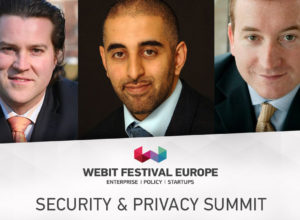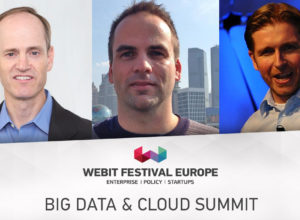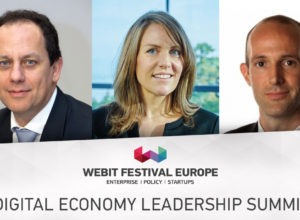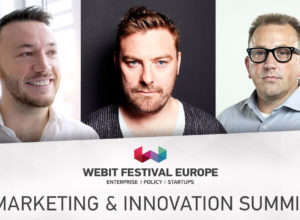Posts by Webit Webit
Are we approaching the Post-App era?
For the last few years we have witnessed an incredible growth in the market for mobile apps, that is expected to generate over 268 billion mobile downloads and an income of $77 billion in 2017.
But now many experts predict the coming of post-app era. This does not mean that apps on our smartphones, tablets and PC’s are going to disappear completely, but that we will be interacting with them differently.
We are seeing the battle between the two most used platforms for mobile iOS and Android since the creation of the smartphone. And while the apps in Apple’s store make the most money, they account to only 15% of all downloaded apps.
The market is changing fast and some apps just lose their attractiveness or becomes a built-in tool in the new phones. That was the case with the flashlight, most camera apps and other things, that your phone already can do.
For example, usage of dedicated video apps declined four percentage points between 2015 and 2016, that of standalone maps apps dropped three percentage points while social media app usage reduced by two percentage points.
On the other hand, the use of messaging apps increased 3% and shopping apps grew with 4%.
According to the CEO of data quality services company PCA Predict Jamie Turner the significant work on newer browser technology that feels as fast as native apps will remove the need for hundreds of them to exist.
Gartner expects that by 2020 almost 40% of mobile interactions will be made by smart agents, or virtual private assistants. This means that we can predict major developments of products like Google Now, Cortana, Siri and Alexa. For the last year the use of digital assistants increased by 4%.
At this year’s Webit.Festival you can listen to some of the top Digital Transformation experts in the world, like the CEO of JetPack Aviation David Mayman, the Partner for Europe and Innovation at VCI Roby Strancel, the CMO of AngelHack Brian Collins and the Chief Designer at SAP Martin Wezowski.
Here you can see a full list of the confirmed speakers at Webit.Festival, while here you can get all the information you need about the tickets for the event.
Find out how to bring your Security & Privacy to the...
Last year made it quite clear that cybersecurity is a serious threat. Major cyber breaches were registered during the American president election campaign and many think that they have played a major part in Donald Trump’s eventual win.
Just in couple of months Yahoo revealed that previous attacks from 2014 and 2013 affected more than 1 billion user records. Meanwhile the hosting company OVH became victim of a 1 Tbps DDoS attack that hit its servers.
That was the largest offensive of its kind ever seen. But just couple of months after the servers of Dyn, the company that controls much of the internet’s domain name system (DNS) infrastructure. Тhat attack’s strength was about 1.2 Tbps.
Now the world expects to see a big improvement in cyber security regulations, while the demand for security skills will continue to rise. The new generation of AI-powered attacks will be crafty enough to emulate the behaviors of users and even to fool the most skilled security personnel.
According to International Data Corporation’s research, by 2020 the business is expected to spend $101.6 billion on cybersecurity software, services and hardware. This is a 38% increase than the $73.7 billion spent on cybersecurity in 2016.
At this year’s Webit.Festival you can listen to some of the top experts in those innovative fields of digital industry. During the Security & Privacy Summit they will share their thoughts on the ways we can secure our digital future, the economics of web scrapping and data protection in cloud services.
The CTO of Intel Security for EMEA region Raj Samani will explain how technology will continue to play an integral part of our future and how can we save the digital world from being held to ransom.
Leaders in Security’s CEO Ulrich Seldeslachts will talk about the active role of his organization in the development of security policies and practices in the domain of industrial control systems and cyber security. LSEC is a non for profit industry association, focused on Information Security in Europe.
The Managing DIrector of Threatspace Dermont Williams will speak on the topic of shared responsibility model, that applies for the security in Cloud computing platforms. He will share ideas about the required solutions for monitoring the usage of sanctioned cloud applications.
Meanwhile in the Digital Economy Leadership Summit experts will discuss the legislative changes that need to be made to ensure cyber security of citizens and institutions.
Here you can see a full list of the confirmed speakers at Webit.Festival, while here you can get all the information you need about the tickets for the event.
Webit.Festival will show you how Big Data and Cloud Services are...
We are standing at the start of a giant transformation, that will change every business and aspect of our lives. In the past two years the world has created more data than in the entire previous history of human race.
According to EMC study, the data volumes are growing so fast, that by the end of 2020 we will create 1.7 megabytes of new information every second. By then our digital storage will grow from 4.4 zettabytes today to around 44 zettabytes, or 44 trillion gigabytes.
Right now the Big Data market worldwide stands around $7.6 trillion, which is bigger than the whole fuel industry. This is the reason many experts said that data has finally become the new oil of the world.
In the next few years we expect the number of connected devices worldwide to reach more than 34 billion. This news is more than welcome for the business, because all the gathered information will completely change the way enterprises approach their customers.
The expanding big data comes with adoption of cloud technology and online delivery of hosted services. This enables companies to consume a computing resources, such as virtual machine or storage, rather than having to build and maintain their own computing infrastructures. In 2016 the spending on public cloud infrastructure reached $38 billion, while Forbes predicts that it will grow to $173 billion in 2026.
At this year’s Webit.Festival you can listen to some of the top experts in those innovative fields of digital industry. During the Big Data & Cloud Summit they will share their thoughts on the development of IoT, Artificial Intelligence, Cloud Technology and convergence of cognitive and cloud security as a business enabler.
The Vice President of Cloud and Mobile Technology Strategy at IBM Jonas Jacobi will talk about the power of the combination between AI and IoT and how it will impact our daily lives - both personal and professional.
Meanwhile, the Community Director and Technology Evangelist at TIBCO Kai Waehner will tell the audience about the latest trends in Cloud Native Architectures, Hybrid Integration Platforms and Microservices. He will also talk about Big Data Analytics, Machine Learning and Real Time Event Processing.
IBM’s Chief Information Officer on Cloud & SaaS Operational Services David Cass will explain some of the fundamental digital changes that the world is going through and how the use of Cognitive and Cloud is helping businesses transform themselves and deliver insights not previously available to them.
The CEO and Co-Founder of Resillo Inc. Eric Klinker will share his global forecast for edge computing and will explain why the rapid scaling of systems across every conceivable industry will not accommodate traditional thinking or traditional architectures.
See Europe’s future reinvented at Webit.Festival
The events in Europe over the past few years draw a bleak picture for the overall future of the continent. The refugee crisis, combined with rise of nationalist movements and Britain’s decision to leave the EU expanded the risk factors for the European project.
But The Old Continent can again become the economic juggernaut it once was, as long as it starts using its full potential.
One of the main missions of Webit.Foundation during the last 9 years is creating new opportunities for business and fostering entrepreneurial ecosystem in the Central and Eastern Europe region.
This year’s Webit.Festival Europe will again become a platform for discussion between top level policy makers and business leaders from all over the continent. The Digital Economy Leadership Summit will be chaired by the President of Bulgaria Rumen Radev and co-hosted by the Head of the European Commission Representation in Bulgaria Ognian Zlatev.
The summit’s discussions will focus on the topic of intelligent specialization of the countries in CEE region, that was recently analyzed by Webit’s Executive Chairman Dr. Plamen Russev on his blog.
Meanwhile, the high ranked guests of the event will share their thoughts on topics, such as Cyber Security, Well Being, Ageing and Biotech, Disruptive Legislation and Digital Democracy, Boosting EU Entrepreneurial Ecosystem and Digital Transformation.
On Webit’s stage you can see some of the people, that are shaping the global agenda of World Economic Forum. The head of WEF for Europe and Eurasia Martina Larkin will speak about the Fourth industrial revolution and the way it will alter the way we live, work, and relate to one another.
Her colleague at WEF and Project leader for Fourth industrial revolution Thomas Philbeck will focus on automation and its role on the changes in employment.
The President and Global brand director of Havas Worldwide Jason Jercinovic will share his thoughts about the role of artificial intelligence in modern politics and how AI will be shaping the voter’s profiles in the years to come.
In the Disruptive Legislation Session the EU Commission’s Adviser Ilias Lakovidis will speak about addressing the societal challenges through digital innovation, while the Chief of the Enforcement Bureau within the Federal Communications Commission Travis LeBlanc will tell us what kind of legislation we need in order to build a better future.
The Investment Director of 3TS Capital Partners Marius Ghenea will share his experience about seizing opportunities and avoiding pitfalls both from the point of view of and investor, but also from a founder’s perspective.
Here you can see a full list of the confirmed speakers at Webit.Festival, while here you can get all the information you need about the tickets for the event.
Will taxes on robots save us from the upcoming loss of...
Robots are taking over our jobs and maybe our entire life as we know it. But among the most worried about the coming change is someone, that you may not expect to see there - the most wealthy man in the world Bill Gates.
In an interview with Quarz last week the billionaire said that governments should tax companies that use robots to temporarily slow the spread of automation and fund labour transition to other forms of employment.
According to the co-founder of Microsoft, this could finance the development of jobs, that will not be taken by machines, such as taking care of elderly people or working with children in schools.
Gates took a leftist position on the issue, saying that governments must oversee such programs rather than relying on the business to redirect the employment and help people with lower incomes.
“Certainly there will be taxes that relate to automation. Right now, the human worker who does, say, $50,000 worth of work in a factory, that income is taxed and you get income tax, social security tax, all those things. If a robot comes in to do the same thing, you’d think that we’d tax the robot at a similar level”, he said.The idea for robot taxation is not entirely new. Last June the European Parliament released a draft report on robotics, which warned that artificial intelligence and automation present legal and ethical challenges that could have severe consequences. The document says that within the space of a few decades AI could surpass human brain capacity in a manner which, if not prepared for, could pose a challenge to humanity’s capacity to control its own creation. Among the proposals in the report was the idea to register robots with authorities and to hold them responsible for the damage they cause, such as loss of jobs. This type of taxation is one of the ideas of the surprise front-runner in the French Socialist Party presidential primaries Benoit Hamon for funding a €750 monthly universal basic income for the citizens of the country. But Bloomberg’s columnist Leonid Bershidsky points out that linking basic income to the destructive influence of automation is not supported by data. According to a research he quoted, the ICT capital would have needed to increase several times as fast as it actually has done if it were to account for both the occupational shift and the unemployment growth during the last couple of decades. If you want to keep up with the hottest trends in the world of artificial intelligence Webit.Festival is the right place for you. During our summits, you can listen to top level speakers such as the Partner in IBM Ventures Christoph Auer-Welsbach and the VP & CTO of VMware for EMEA region Joe Baguley.
Learn how to build your marketing strategy from industry’s best at...
Our life today is more dynamic than it was at any point in history and none of our days is like the previous one. In the world of business this new form of operation speed is both a gift and a curse depending on your company’s ability to adapt to the social and economic changes and use the full potential of the new environment.
In 2017 serious marketers use every tool in the kit, from native ads and influencer channels to visual storytelling and now or never expiring content. The biggest trends in the industry will help these expert engage consumers more directly by increasing their marketing reach.
At this year’s Webit.Festival you can listen to some of the top marketers in the world. During the Marketing & Innovation Summit of the event they will share their thoughts on topics, such as Programmatic, Mobile, Video and Native Advertising, Brand Strategies, Metrix & Data, Mobile Marketing, OmniChannel & Personalisation Strategies and Media & Digital Entertainment.
Their insight information will help you transform your business into the enterprise of tomorrow and will give you the best tools to increase your performance.
As more and more brands learn the true value of content, our lives are becoming increasingly over-saturated in information. This means the competition for our attention has never been greater and getting eyes on your content is no longer good enough. The design director of TBrand Studio International Graham McDonnell will tell us more about the importance of the story in storytelling.
The President and Global Brand Director of Havas Worldwide Jason Jercinovic will talk about the rise of Artificial Intelligence and its role in today’s politics and political marketing. Meanwhile, the CMO of Selligent Nick Worth will tell us more about marketing automation and the use of AI.
During the Brand Strategies track, the Chief Creative Officer at DigitasLBi Chris Clarke will tell us more about the death of empathy in marketing and why global brand consistency doesn’t matter anymore. Chris is a member of the Campaign A-List and was recently placed at #53 in The Drum’s Adverati, a list of the most influential people in advertising.
Twice Reply’s Managing director for digital transformation Volker Glaeser will inform you how new innovation processes can change the digital world and what are the most efficient ways of creating and testing future products. The German expert will explain the two most important approaches of today’s leading global innovators - Rapid Prototyping and Constant Beta.
The General manager of Advertising at Phunware Jon Hook will talk about the changing landscape of mobile advertising, what are the best ways to adapt your strategy to that change and where are the biggest gaps when starting a mobile ad tech business.
Meanwhile the Global chief strategy and digital officer at Mindshare Norm Johnston will explain the exploding market of connected devices and how to use the marketing opportunities it brings to better connect and service consumers. In his session, Norm will share examples from his recent book Extra Sense, which illustrate how marketers are exploring the post-mobile third wave of digital marketing.
Here you can see a full list of the confirmed speakers at Webit.Festival, while here you can get all the information you need about the tickets for the event.
See the Digital Transformation explained on Webit’s stage
Digital transformation is the process of adopting digital technology in all aspects of human society. Right now it sits atop the strategic agenda for businesses around the world and two-thirds of the top executives worldwide predict that their organizations will be vastly digital after the next two years.
This will not be easy task, but it may bring huge opportunities for emerging and already established businesses.
In the next 10 years between 40% and 60% of the companies in Fortune’s 500 will not play the same role on the world. Their places will be taken by new enterprises that manage to adapt best to the economic realities of the future.
Over the last 8 years Webit.Festival has been all about creating density of opportunities for the business and entirely new entrepreneurial ecosystem. Among the 5000 guest of this year’s event in Sofia you can find top level speakers from all over the world, that will talk about the latest trends in the world of digital transformation.
During the event’s Digital Transformation Summit the CEO of JetPack Aviation David Mayman will tell the audience about the smallest and lightest jetpack ever created and the change it can bring to the transportation industry.
The chief designer of SAP Martin Wezowski will share his thoughts on how to build the future we want to live in and the merging meaning of what to be an innovator and designer.
He will also talk about the designer’s role in creating of everything, including social and political systems in a space between cutting edge technology and humanism.
The partner for Europe and Innovation at VCI Roby Stancel will talk about the digital transformation in the most real world. He brings to the stage two decades of experience in innovation, services, strategies, roadmaps and cultural transformations for over 100 partner companies. Now Stancel offers a unique combination of design thinking innovation and business strategy.
As founder of Change Sciences, Pamela Pavliscak advises designers, developers and decision makers on how to create technologies that promote well-being. On Webit’s stage she will tell the audience how to design happiness - which has been the promise of technology right from the start.
Researches suggest that technology has negative impact on our lives instead of aspiring us to get better at our work and augmenting human abilities. Pamela will share her thoughts on how we can start designing a long-term well-being rather than short-term goals.
The Chief marketing officer of AngelHack Brian Collins will tell the best options for the existing communities to leverage their resources and build up their well-being.
Right now AngelHack is the world’s largest and most diverse global hacker community. The company helps drive open innovation of tech products, platforms and brands with extraordinary smarts, scale and speed with tech education and hackatons.
The CEO and Founder of SignAll Technologies Zsolt Robotka will speak about the first automated sign language translator that can improve the lives of 70 million people and unlock services for the deaf. Furthermore, the expert will share his thoughts on how to accommodate sign language users in smart cities.
Here you can see a full list of the confirmed speakers at Webit.Festival, while here you can get all the information you need about the tickets for the event.
Is automation the developer’s nightmare or a much needed help
The fourth industrial revolution has already led to transformations that alter our way of life fundamentally. But perhaps the most important of them all is the change in the labour market, which affects hundreds of jobs and can become a challenge even for the most sought ones - the developers.
Recent study, conducted by the Oxford University, showed that 47% of jobs in the United States are at risk of being automated in the next two decades. But according to McKinsey Global Institute, only 5% of all occupations are at risk of being entirely automated.
Rather than disappearing, the report’s authors say, jobs will change dramatically, forcing workers to adapt. McKinsey’s analysis of 800 occupations and 2,000 job tasks predicts that half of workers’ current tasks could be automated by the year 2055 using technology that currently exists.
The experts think that those changes will not lead to mass unemployment. Instead, the automation could increase global productivity by 0.8% to 1.4% annually over the next 50 years.
Those jobs are not only in the manufacturing sector, where robots will soon be doing almost every task. Today we can see the automation slowly taking over many white collar occupations, and this is just the beginning.
Industry data show that enterprises are investing more money in platforms, tools and automated processes and less in manual professional services. Eventually experts predict that robots or robo-software will replace developers and will prove to be the only solution able to support the increasing demand.
The CEO of Zuznow mobile development platform Chen Levkovich told Venture Beat that while many developers oppose automation, the new tools can help them become more efficient.
Last November Forbes reported that the custom software development company Dev9 is using artificial intelligence to eliminate strenuous processes and drastically reduce manual overhead.
Using teams of 3 to 8 people, with expertise ranging from architecture, development, project management, quality and deployment, Dev9 develops original technology that rapidly, reliably and repeatedly pushes software enhancements and bug fixes to customers at a low risk.
To learn more about the future of software development and DevOps, join the Dev Summit within Webit.Festival. On the scene you’ll see and hear top level speakers, such as the Founder and CTO of Maria DB Foundation Michael “Monty” Widenius, the Founder and CTO of Hired Allan Grant, and the Developer Evangelist in Amazon Peter Heinrich.
Digital assistants are shaping the future of services
Digital transformation is on the rise worldwide and with it comes the increasing pressure on large public institutions and enterprise to become more efficient in their work. This process is closely connected with the development of artificial intelligence technology and digital assistants and has the power to totally transform the public and customer services sector in the years to come.
The IoT technologies made cross-device integration common, while the lines between reality and digital world are more blurred than ever.
Experts predict that in 2017 millions of users around the world will get used to dealing with bots, and synchronizing their lives and operations to include digital assistants.
Microsoft and Google already added powerful AI services to their cloud platforms and now they allow anyone with coding knowledge to create simple chatbots. This means lower financial costs for customer service and saving time from manual operations.
Earlier this week Bloomberg reported that the Chinese phonemaker Huawei is working on its own voice-activated assistant, just like Apple Siri and Amazon Alexa. Initially it will be exclusive for the customers in China. But later this year the company is planning to release a second version of its digital assistant for the US customers of Huawei Mate 9.
Once a standout feature, competitors to Alexa, Siri, and Google Assistant could soon become a crowded market, with companies such as Adobe, Samsung, and potentially even Nokia all planning a hat of their own to throw in the digital assistant ring.
The Chinese search giant Baidu has unveiled its assistant Xiaoyu Zaijia (Little Fish), who responds to voice commands with a combination of pictures, text and speech. It can answer questions, find local services, play music, make video calls and control smart home devices.
According to the company’s chief scientist Andrew Ng AI is the new electricity with its steady growth.
“Every year our AI has been 50% better. Those of us on the inside feel the acceleration now but we have been feeling it for the last decade. Just as 100 years ago the electrification of our society transformed industry after industry, I think AI tech has now reached that stage”, he told BBC.
Gartner predicts that AI will become so important to enterprise that by the end of the year the worldwide spending on IT will reach $3.5 trillion.
If you want to keep up with the hottest trends in the world of this growing industry, then Webit.Festival is the right place for you. During our summits, you can listen to top level speakers such as the Partner in IBM Ventures Christoph Auer-Welsbach and the VP & CTO of VMware for EMEA region Joe Baguley.








